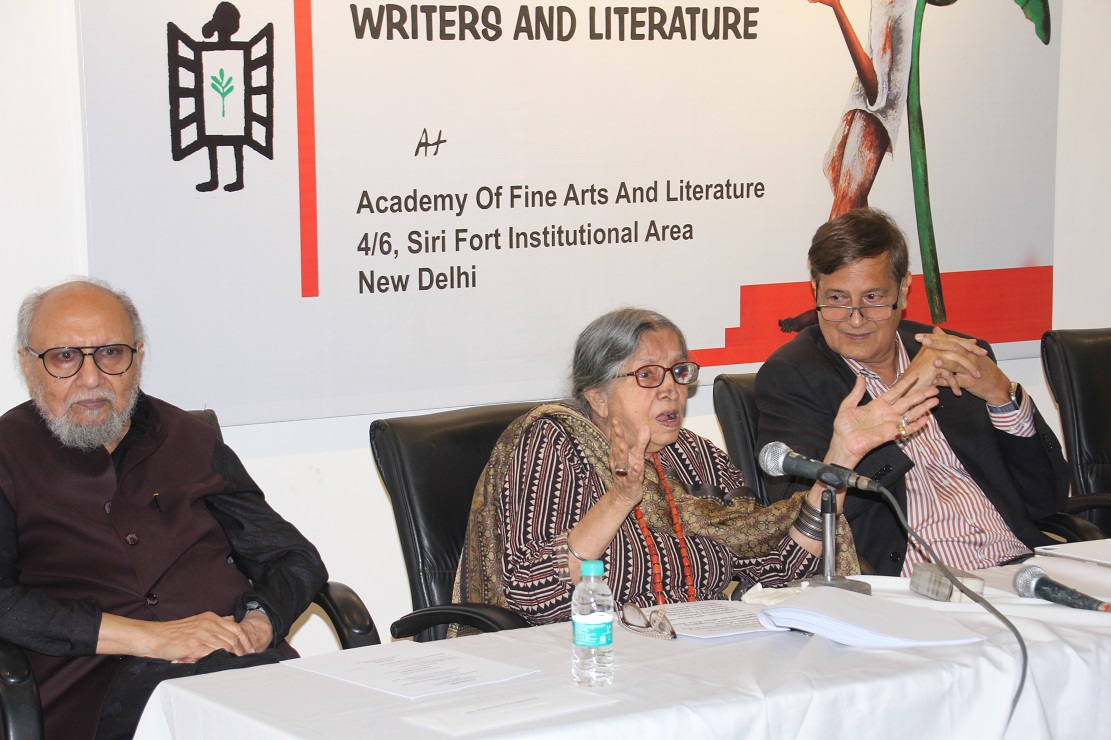The written word has the potential to transcend boundaries and bring communities together in a manner that not much else can. Perhaps one of the best examples of this is the FOSWAL Literature Festival held in Delhi, which has been promoting regional literature for many years. Since its inception, FOSWAL (the Foundation of SAARC Writers and Literature) has worked to nurture and strengthen the cultural ties between the countries of the SAARC region through literary and cultural
interactions.
The idea has always been to promote peace and tranquilly in the region by encouraging discourse and dialogue between people. Famed writer Ajeet Cour has been the driving force behind this festival and continues to be at the helm, aided by her daughter, artist Arpana Caur, and an able team. This edition of the festival was personally sponsored by the latter after a series of institutional mishaps.



This year’s festival took place from March 26–28 at the Academy of Fine Arts and Literature in the Siri Fort Institutional Area in Delhi. The chief guest for the event was Nasser Munjee, Chairman of the Aga Khan Foundation. Other guests of honour included Ramendu Majumdar from Bangladesh, Dr. Kunzang Choden from Bhutan, Bhisma Upreti from Nepal, and Kanchana Priyakantha from Sri Lanka. Ambassador Suresh K. Goel, Ambassador Deepak Vohra, and Dr. G.N. Devy from India also graced the occasion. 16 writers came from Bangladesh, three from Bhutan, nine from Sri Lanka, and 14 from Nepal. More than a hundred came from different parts of India, including Kerala, Bengaluru, Jaipur, Punjab, Uttar Pradesh, and other areas.
The event began by honouring the former President of Bangladesh, Sheikh Mujibur Rehman, for his contribution to literature, and then Ajeet Cour presented a moving speech to the audience. She said, “I am elated that eventually we are here, basking in the cosiness of our togetherness, hugging each other after five years! Though we have met online, it has been devoid of the feeling of togetherness and the warmth of your embraces.” In her inaugural speech, Cour narrated the story of the Foundation of SAARC Writers and Literature, specifically highlighting the wonders of Track II’ diplomacy that cultural organisations like this one enable. “We helped with locating the village and the family of Ajmal Kasab, the terrorist who was caught alive after the 26 November attack in Bombay, through our close friend Hamid Mir of Geo TV, Pakistan. We requested that he locate Ajmal Kasab’s village and his family. After he succeeded in doing so and the father confessed that Ajmal Kasab was his son, the government of Pakistan, which had been denying any involvement of the country in the 26/11 attack, was silenced. In silence, they accepted Pakistan’s involvement in the treachery in Bombay,” she said. A number of awards were also presented on the occasion. Dr. Kunzang Choden from Bhutan received one for writing the first-ever novel in Bhutanese and English.
Others went to eminent writers, poets, and scholars: Dr. Rinzin Rinzin from Bhutan, who has also been a Member of Parliament; Prof. Hampa Nagarajaiah from India, a scholar from Karnataka; critic, translator, editor, and poet, Prof. Alok Bhalla from India; poet, writer, and translator Bhisma Upreti from Nepal; writer and publisher Kanchana Priyakantha from Sri Lanka, who is the chief coordinator of FOSWAL in Sri Lanka; and writer, translator, and academic, Kausha Kumarasinghe from Sri Lanka; and poet, writer, and translator, Kausha Kumarasinghe from Sri Lanka; and poet, poet, and translator, Kant
“It was a meaningful meeting of intellectual minds and writers from across borders. Everyone was outstanding. We had participants like Mofidul Hoque from Bangladesh, who conceived and built the War Liberation Museum in Dhaka, and writers like Suman Pokhral, who have reached across the borders with their creativity: Pyinngeinda and Inzananyani from Myanmar, Phramaha Niran Chueachit from Thailand, and Le Quang Nhan from Vietnam. Our other honoured guests included Mahatma Gandhi’s granddaughter Tara Gandhi Bhattacharjee, Sant Balbir Singh Seechewal, a Member of the Rajya Sabha, and a renowned environmentalist from Punjab. All of them brought breath-taking, intellectual views to the festival,” says Arpana Caur.
Since all work and no play makes for a dull festival, the foreign delegates went on an organised excursion on the third day to see the Qutab Minar. Ajeet Cour summarises, “In the end, over tea and pakoras, there were hugs and hugs all the way! We wished our delegates a safe journey back home and requested that they keep coming back. They are our own migratory birds from across the borders. Our own daughters and sons, our own sisters and brothers They are FOSWAL’s extended family!”
Noor Anand Chawla pens lifestyle articles for various publications and her blog, www.nooranandchawla.com.

